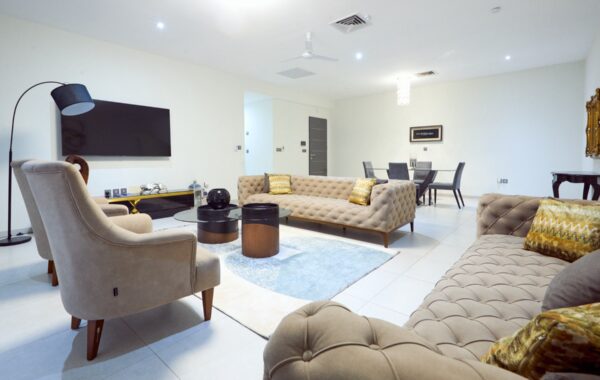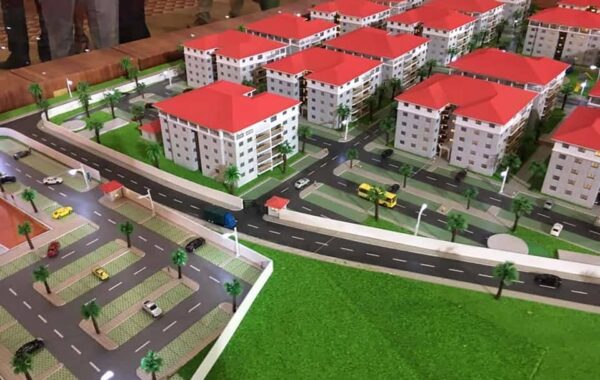
Why Ghana’s Luxury Real Estate Market Is Booming
Ghana’s luxury real estate market is experiencing an unprecedented boom that’s capturing global investor attention. The luxury property market is booming because multiple powerful economic, demographic, and structural forces are converging simultaneously to create perfect conditions for sustained growth.
Understanding why this boom is happening reveals exceptional investment opportunities across Accra’s prime locations, where property values rise 8-10% annually and luxury apartments command monthly rents of $2,500-$5,000.
Economic prosperity drives unprecedented demand
The luxury real estate boom stems from Ghana’s remarkable economic transformation. GDP growth of 5.7% in 2024 creates substantial wealth among high-net-worth individuals seeking premium properties.
Ghana’s mining sector boom generates the wealth driving luxury purchases. Gold exports reached $11 billion in 2024 – a 53% increase from previous years. This mining prosperity creates disposable income specifically targeting luxury real estate investments.
Diaspora remittances of $6.65 billion in 2024 represent another key boom driver. This massive capital inflow nearly doubled from previous years, providing direct funding for luxury property purchases as successful Ghanaians abroad invest in premium homes.
Currency stabilisation enhances the boom by reducing investment risk. The cedi’s depreciation slowed to 19% in 2024 compared to historical rates exceeding 60%, creating confidence among both local and international luxury buyers.
Demographic revolution fuels long-term growth
The luxury market is booming because Ghana’s population structure creates perfect demand conditions. 57% of the population is under age 25, representing future luxury property buyers as they advance in careers and accumulate wealth.
Rapid urbanisation drives the boom by concentrating affluent populations in prime locations. Urban population reaches 58.58% in 2025, with most growth occurring in Greater Accra where luxury developments are concentrated.
The expanding middle class creates the boom’s foundation. Projections show 15 million middle-class citizens by 2025 – representing 30% of the population and doubling from previous estimates. This expansion provides domestic purchasing power complementing international demand.
Professional services sector growth of 6.1% supports the boom by increasing high-income demographics. These professionals represent primary luxury property buyers seeking upscale housing that reflects their elevated status.
Government policies eliminate traditional barriers
Strategic policy reforms are enabling the luxury real estate boom by removing previous investment obstacles. The pending GIPC Amendment Bill will eliminate minimum capital requirements for foreign investors, dramatically simplifying luxury property investment processes.
Infrastructure investment of GHC 6.3 billion in 2025 directly supports the boom by enhancing prime residential areas. Major road improvements and the $250 million World Bank electricity facility address infrastructure concerns that previously deterred luxury buyers.
Land administration reforms fuel the boom by targeting 30-day registration turnaround compared to current 4-12 month processes. Digital systems reduce transaction complexity while improving title security, a critical factors for luxury property investors.
Tax policies sustain the boom through investor-friendly structures. Property transfer taxes of 0.25-1% and annual rates of 0.5-3% maintain attractive investment economics for luxury properties.
Regional stability creates competitive advantage
The luxury market is booming because Ghana offers superior stability compared to West African alternatives. Political stability and established legal frameworks provide investment security that neighbouring countries lack.
Transaction security drives the boom by surpassing regional standards. Comprehensive legal frameworks and mandatory registration requirements offer greater certainty than alternatives in Nigeria or Ivory Coast where documentation reliability remains problematic.
Competitive pricing fuels the boom by offering exceptional value. Luxury properties in Accra range $250,000-$400,000 compared to Lagos at $300,000-$800,000+. This valuation gap, combined with superior growth fundamentals, attracts international investors.
Technology and lifestyle trends accelerate growth
Modern luxury demands drive the boom as developments integrate cutting-edge amenities. Smart home technology, wellness facilities, and sustainable design become standard features commanding premium pricing.
Properties incorporating AI-powered surveillance, automated systems, and wellness amenities generate rental premiums of 15-25% above traditional luxury offerings. This technological differentiation sustains the boom by attracting affluent tenants willing to pay premium rents.
Three major projects totalling 3,000 housing units received EDGE certification in 2024, making sustainable design mainstream. Green building features increasingly drive luxury buyer decisions, supporting continued market expansion.
Supply constraints amplify boom conditions
Limited luxury inventory intensifies the boom by creating scarcity premium. High construction costs reaching $3,000 per square meter due to import duties limit new supply while supporting pricing power for existing properties.
Prime location scarcity drives the boom as Cantonments luxury apartments command $200,000-$230,000 while executive properties reach $4.5 million. Limited developable land in established neighbourhoods creates natural supply constraints.
Professional services supporting luxury developments remain scarce, creating barriers to rapid supply expansion. This scarcity sustains the boom by preventing oversupply that would pressure pricing.
Investment returns validate boom fundamentals
Exceptional returns justify the luxury real estate boom. Rental yields of 8-11% annually significantly outperform global luxury markets while property appreciation of 5-8% provides capital growth.
Strong occupancy rates exceeding 90% in prime locations demonstrate sustained demand supporting the boom. Corporate tenants and expatriate professionals provide stable rental income streams.
The boom creates wealth through multiple channels: rental income, capital appreciation, and currency hedge benefits for international investors seeking African exposure.
Frequently Asked Questions
Q: What specific factors are driving Ghana’s luxury real estate boom?
A: The boom results from economic growth (5.7% GDP), mining wealth ($11B gold exports), diaspora investment ($6.65B remittances), and demographic trends (57% under 25).
Q: Why is Ghana’s luxury market outperforming regional competitors?
A: Superior political stability, established legal frameworks, competitive pricing, and investor-friendly policies create advantages over Nigeria, Ivory Coast, and other West African markets.
Q: How sustainable is the current luxury real estate boom?
A: Multiple demand drivers including continued economic growth, ongoing urbanisation, and infrastructure investment suggest sustained expansion through 2025 and beyond.
Q: What returns do luxury properties generate during this boom?
A: Premium properties achieve 8-11% rental yields with 5-8% annual appreciation, significantly outperforming many global luxury markets.
Q: Which locations benefit most from the luxury real estate boom?
A: Airport Residential Area, Cantonments, and East Legon represent the primary beneficiaries, with East Legon Hills showing particular promise for future appreciation.
Join Ghana’s luxury real estate boom with confidence. Eden Heights represents the pinnacle of this market transformation, offering world-class amenities and premium finishes near West Hills Mall. Our luxury apartments and penthouses capture all the factors driving Ghana’s property boom while providing exceptional investment returns.
Contact our Eden Heights team today for your private consultation and discover why Eden Heights leads Ghana’s luxury real estate revolution.


